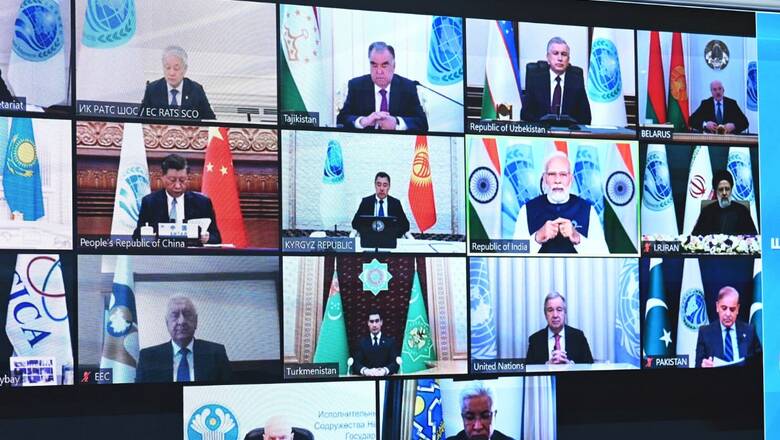
views
The meetings of the Shanghai Cooperation Organisation (SCO) have always evoked interest in the West, and a measure of envy, given its sheer size and continuing expansion. The fact that the summit was held virtually, rather than with the usual pomp and ceremony accorded to such events, led to even more speculation than usual with US analysts ascribing this to Washington’s pressure on Delhi, and ‘awkwardness’ after the fanfare of the Modi visit to the US. This rather specious argument overlooks the fact that major leaders are to visit Delhi just two months down the line for the G20 meeting and that Prime Minister Modi very pointedly called Russian President Putin just three days after returning to India. These speculations arise from the fact that no one can really make out what the SCO is about, in terms of international relations and the Asian power balance in particular. Admittedly, it is rather a strange grouping.
SCO as a security organisation?
At the summit, Chinese President Xi Jinping in his speech flagged the Global Security Initiative — which is based on respect for territorial integrity and sovereignty — and called for a political settlement of international and regional hotspots, “so as to forge a solid security shield in our region.” That’s an interesting term. But a security shield — like that of NATO for instance — is based on settled borders and a degree of trust. Remember that the SCO was formed in 2001 bringing together China, Russia, Kazakhstan, Kyrgyzstan, Tajikistan and Uzbekistan on the basis of military confidence-building measures, following the settlement of the borders by all parties.
In other words, the basis of SCO is that there were no territorial disputes among the original signatories. When India and Pakistan joined in 2017, the main issue was the territorial dispute among them, which by the Charter, was not to be discussed in the SCO. Imran Khan brought it up anyway, as did Bilawal Bhutto at the Goa presser. But that’s Pakistan. What is notable is that India is the only SCO member left with whom China has a ‘hot’ territorial dispute.
On another level, at least two SCO states have supplied weapons to the war in Ukraine — Pakistan to Ukraine and China to Russia. The Central Asian states have not recognised Russian annexations, not even Crimea, and are justly worried about the integrity of borders. PM Modi stressed this aspect in his address to the US Congress.
So no, SCO as a body doesn’t endorse any violation of borders even though it doesn’t publicly condemn Russia. But it is certainly not united on this issue. A ‘security shield’ is rather impossible under such circumstances.
The SCO is a BRI forum in disguise
It’s true that the SCO is now the largest such grouping in the world. On a map, SCO spans almost the entire Asian continent. Then observe that 22 of 24 are members of Beijing’s Belt and Road Initiative (BRI). Russia is not a formal partner, but it ‘cooperates’ with China on connectivity, including the Russian Pacific Railway, which will expand capacity along the Eastern axis of the Trans-Siberian railway and finally reach the Russian Arctic. Besides, as experts observe, Chinese investment in Russia’s Far East reached US$1.6 billion in 2022, with some 26 new investment projects. That’s a lot. In other words, India is again the only holdout.
At the summit, both Pakistan and China pushed the BRI. The SCO repeatedly stresses connectivity, and it seems that this is one area that India is interested in, though it is still the China-Pakistan Economic Corridor in disputed territory. But China and India are both backing Bangladesh’s port at Mongla, and an indirect link seems to be developing in Chahbahar, where a Chinese ship docked recently, though at a different terminal. With Uzbekistan part of an India-Iran Trilateral, there is a possibility of the flow of goods from Western China, using Uzbekistan’s railway network. PM Modi’s remarks flagged Chabahar as the International North-South Trade Corridor (INSTC), though only for Central Asian trade. A drastic shift from competition to cooperation with China in this area is possible. But it’s really up to Beijing.
So yes, the SCO is almost a BRI forum, but India can ride that to ensure its own interests in trade and connectivity.
Counter-Terrorism
For India, the stress has always been on counter-terrorism, which the SCO flags with RATS (Regional Anti-Terrorist Structure), based in Tashkent. The last meeting of the grouping, held in Delhi and chaired by the Deputy National Security Advisor, D. Padsalgikar, decided to conduct a joint border operation between the border services of member states called ‘Solidarity-2023.’ The SCO has also led at least six iterations of anti-terrorism military exercises called ‘Exercise PEACEFUL MISSION’ where 200 Indian Army and airforce personnel had participated in Russia. But on the Peace Mission ground, the reality is quite dismal. That’s not just Pakistan’s backing of terrorism in India and Afghanistan. It’s about China also blocking CT actions, including the designation of Sajid Mir as a terrorist at the United Nations.
The Economic Aspect
A reading of the SCO members’ economic status is revealing, with two new dialogue partners — UAE and Kuwait — taking the total to 21, accounting for some 40 percent of the world’s population and nearly one-third of the global economy. Among the 24 members including dialogue partners, only three are classified as ‘High income’ – which are the oil exporting countries, eight as ‘Upper middle income’, and the rest are lower income. In other words, the majority is economically vulnerable and unlikely to be major trade partners. China is already India’s second-largest trade partner, with or without the SCO. Russia is still an important partner in defence trade.
Now look at the India page of the SCO. The initiatives mentioned are imaginative, including workshops on shared Buddhist heritage and encouraging startups. It’s a nice platform to increase soft power. But there’s really nothing on revving up trade. The initial declarations for a free trade area are again unlikely to happen, given China’s massive economy.
In sum, there seems to be no particular value in India’s SCO membership, which may be another reason to shift it to the sidelines by holding only a virtual meeting. But observe that the organisation now includes all of India’s neighbours. That means New Delhi has no choice but to participate. Second, as the organisation expands rapidly — Egypt and others are waiting on the sidelines — it’s a forum to flag key areas like terrorism from Pakistan. Don’t run away with the idea that this is now old hat as Pakistan weakens. It’s not. Third, India is the second-largest economy in the bloc. That matters. Especially to central Asians for whom the prime minister had a special pitch in his speech. Fourth, the potential for connectivity is immense and is one issue that interests all members, particularly Central Asia and Russia. Fifth, given that the meeting includes those between National Security Advisors, Defence Ministers and Foreign Ministers among others, it is an important forum to discuss matters with China in particular. In times of tension, the more officials meet, the better. That is the main lesson of the Cold War years. Sixth, Delhi should use it to push for specific measures on climate change. Even the smallest shift in emissions, for instance, will matter massively within such a large grouping.
And finally, if all these meetings and speeches contribute to making the ‘West’ uncomfortable, then it’s worth the price of an official jamboree. Next time, do the pomp and ceremony thing. At the least, it has analysts in a tizzy.
The author is a Distinguished Fellow at the Institute of Peace and Conflict Studies, New Delhi. She tweets @kartha_tara. The views expressed in this article are those of the author and do not represent the stand of this publication.




















Comments
0 comment